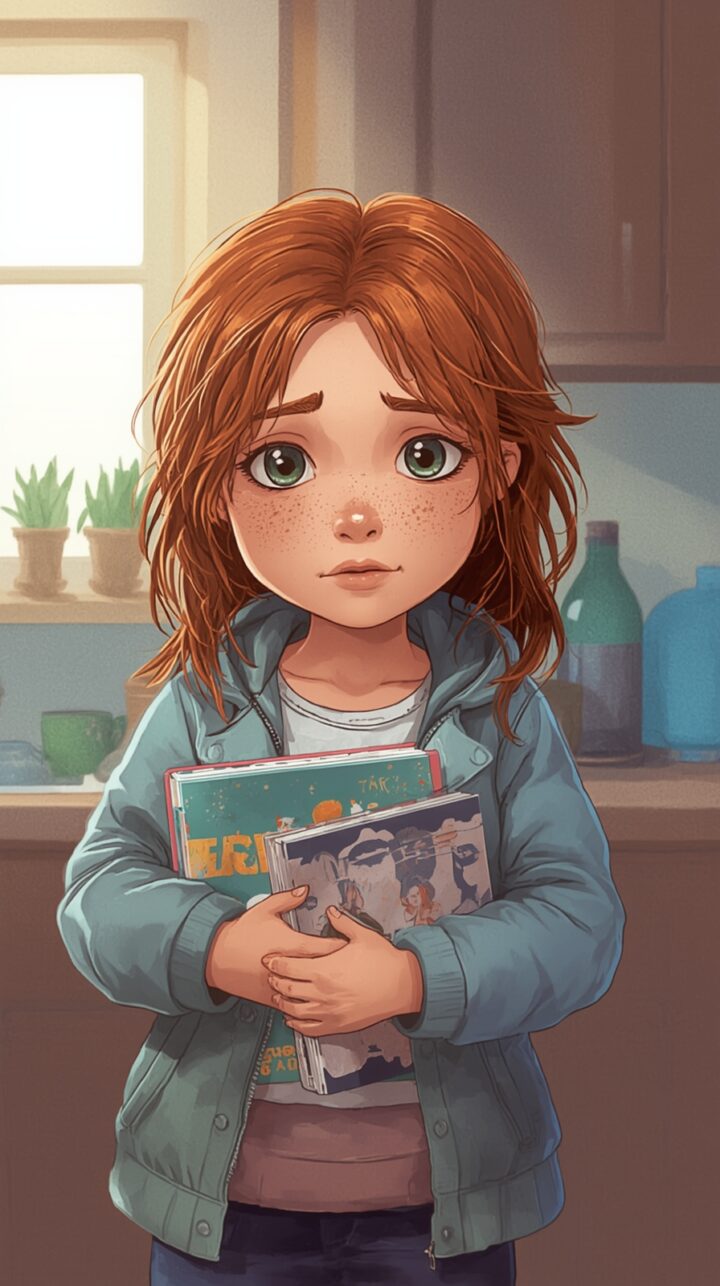
A heartfelt tale of fear, friendship, and the quiet strength it takes to tell the truth.
📌 Author’s Note: How a Brave Girl Speaks Up
This short story, How a Brave Girl Spoke Up, was originally written by me, Vicky Hobbs, back in 1989 as part of a high school creative writing assignment. I was just a teenager at the time, and this piece was one of the first times I tried to capture how it feels to be a kid who’s misunderstood, judged, and still finds the strength to speak up.
My instructor gave me feedback I’ll never forget:
“This moment—when the brave girl speaks up—should be the climax.”
They encouraged me to push that scene forward emotionally and narratively. I didn’t realize then how much that advice would shape my writing voice.Decades later, I’ve revisited this piece with a clearer structure and updated language, but the heart of it remains the same: it’s about how powerful—and terrifying—it can be for a child to tell the truth out loud.
This story is also a companion piece to another I recently published:
👉 First Day of School: A Short Story About Friendship
Both explore the quiet resilience kids often show in the face of fear, silence, and peer pressure.
💬 Did this story resonate with you?
Have you ever had a moment where you—or someone you knew—had to speak up even when it was hard?
Let me know in the comments, or share this with someone who could use a reminder of how brave even quiet voices can be.
I DON’T WANT TO GO
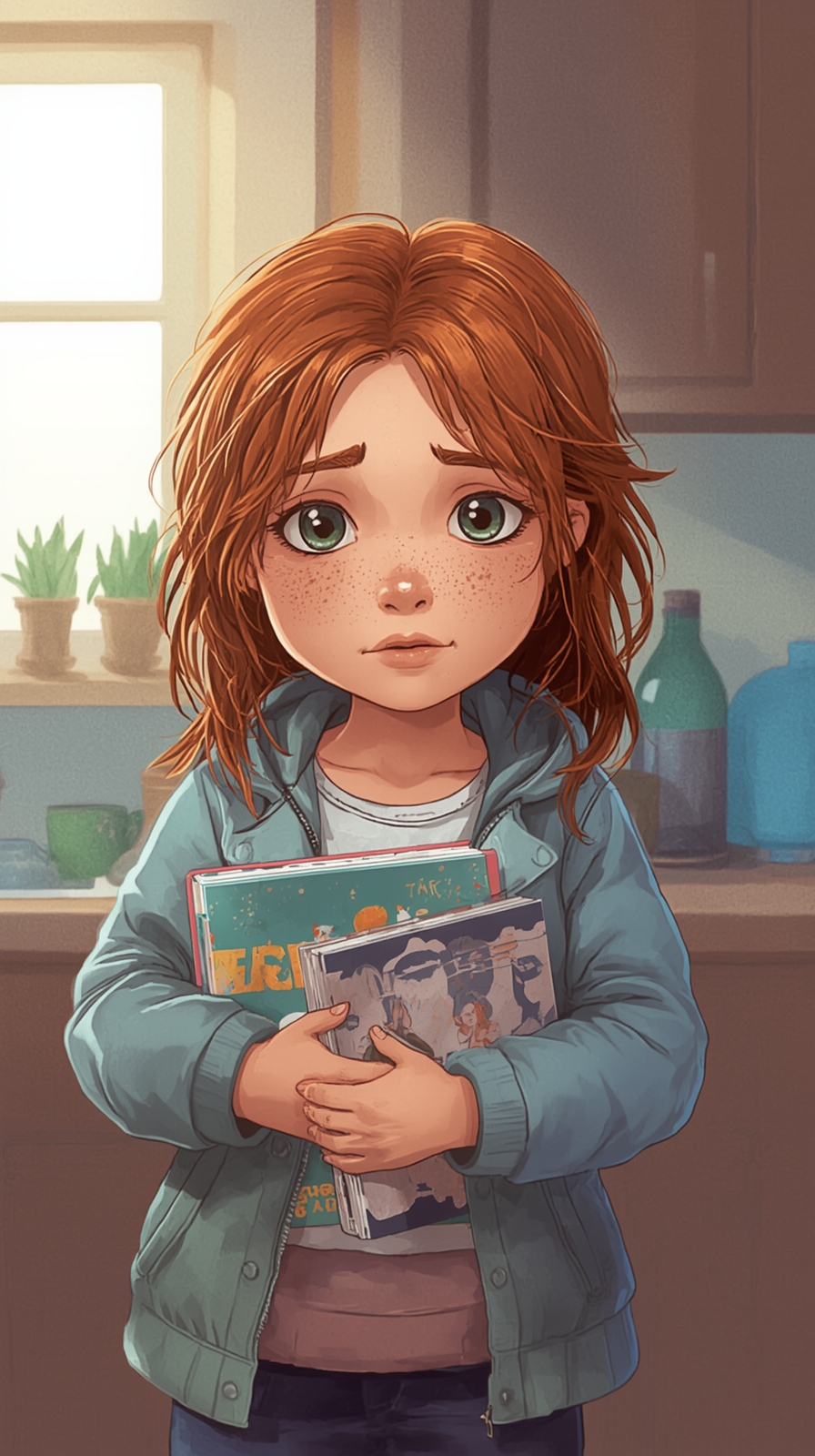
“I don’t want to go to school,” Marcy wailed. “Everybody will laugh at me and want to know how I got a black eye!”
Hugging her mother tightly, she whispered, “Please let me stay at home today.”
“Now, Marcy,” her mother said, “nobody will laugh at you. Besides, it’s not your fault that you walked in your sleep and ran into the door. So put your coat on and go to school.”
Marcy reluctantly put her coat on and gathered her books. As she stepped outside, she frowned darkly and said, “Nobody understands.”
Marcy was a red-headed, ten-year-old fourth grader. She had freckles on her nose and green eyes. Her best friend, Nancy, whom she had met in kindergarten, was walking down the sidewalk. The girls lived on a pleasant, tree-shaded street two blocks from school. Each morning, they met in front of Marcy’s house to walk to school together.
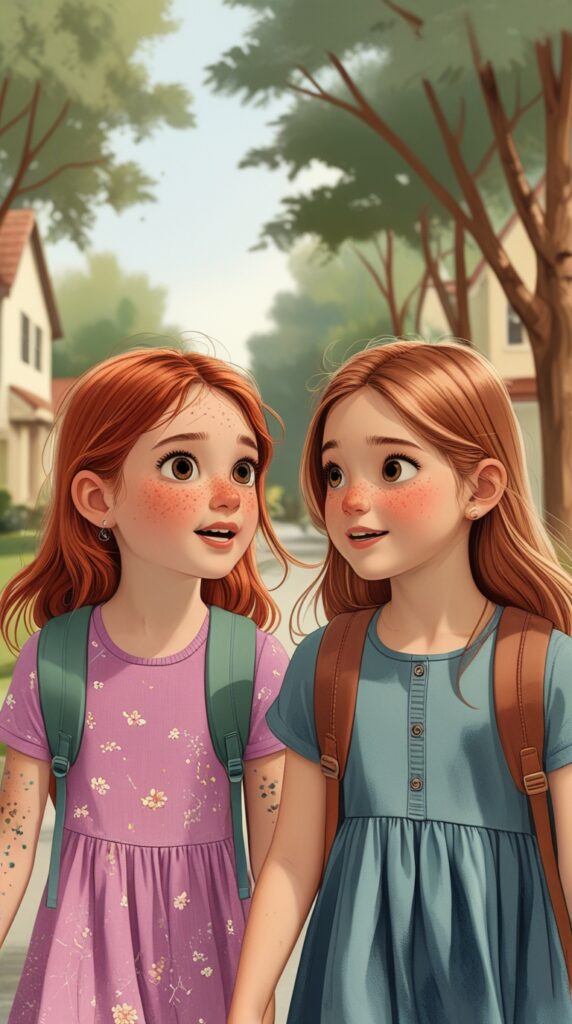
As Nancy drew closer, she noticed the large black circle around Marcy’s eye. She wanted to ask what had happened—but didn’t. After all, she and Marcy were best friends. If Marcy wanted her to know, she would tell her.
“Hi, Nancy. How are you? Did your dad get back last night? Are y’all gonna get to go with him this weekend?” chattered Marcy.
“Whoa!” said Nancy. “One question at a time. I’m fine. Yes, my dad made it back, and we don’t know if we’re going or not. Did you study for your spelling test last night?”
“Yes,” Marcy said. “I’m trying to make straight A’s so my mom will give me ten dollars for those skates I want. Look—only one more block. I’ll beat you!”
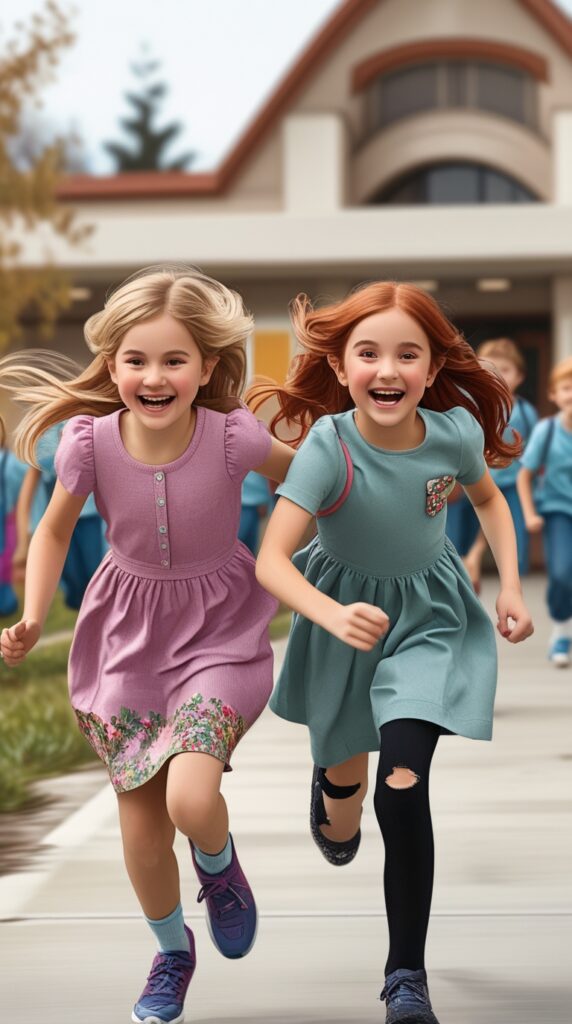
With that, Marcy broke into a run. She and Nancy continued their race. Both were panting and hot but arrived at the door at the same time.
“See ya at recess. If I’m late, Ms. Brewer will give me detention.” With that, Nancy slipped into the building.
“Okay, I’m glad she’s not my homeroom teacher!” Marcy laughed.
Marcy stopped at the restroom to see if her eye looked as obvious as it felt. Pulling her hair forward, she headed to class. As she entered the room, she felt as though everybody was staring at her, so she quickly sat down.
Mr. Goodwin, the fourth-grade teacher, called the class to order and asked them to line up at the door. All fourth-grade classes were gathering in the library for a guest speaker.
When they arrived, the room was buzzing with students settling into chairs and onto the carpet. Marcy scanned the crowd and spotted Nancy sitting with her homeroom class. Nancy gave her a quick wave. Marcy returned it with a small smile, then tugged her hair farther over her black eye.
Once everyone was seated, Mr. Goodwin stepped to the front and said, “Boys and girls, please welcome our guest speaker, Miss Gates.”
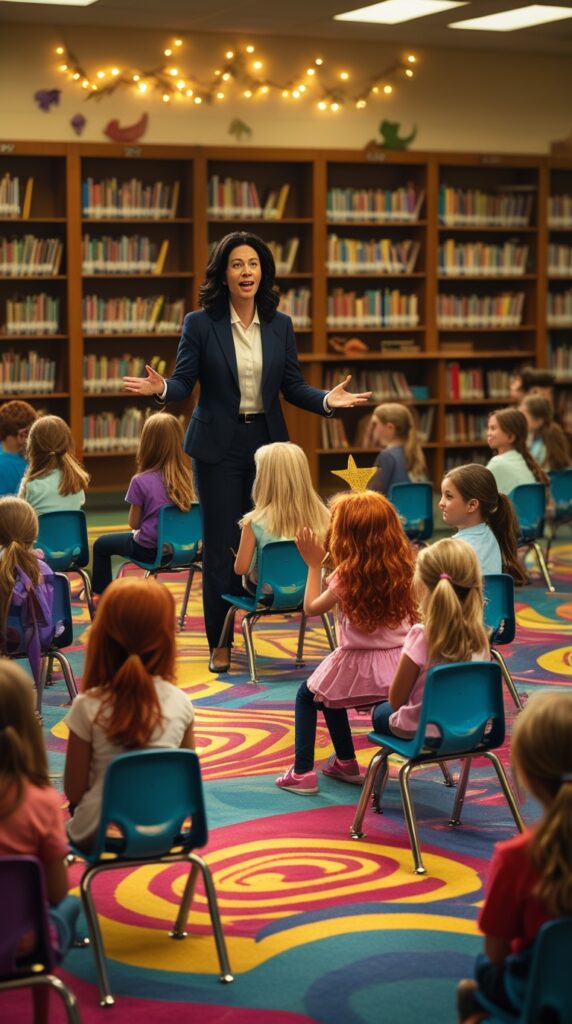
The room grew quiet as Miss Gates stepped forward and began to speak.
“Good morning, everyone. Today I’m going to speak on child abuse. Many children are abused each day. These children are scared and lonely. They want to tell someone about their problem but don’t really know how. If they do tell, and the proper steps are not taken, the child may be beaten more often as a result of having tried to get help.”
Miss Gates spoke for several more minutes before drawing toward the end.
“You can help these abused children by noticing if a child seems lonely or if he or she has bruises or scratches. If they do, be their friend. Tell your teacher or your parents about this child, and help them receive the care and love they need. Does anybody have any questions?”
A thin, shy boy with glasses in the front row, named Larry, raised his hand.
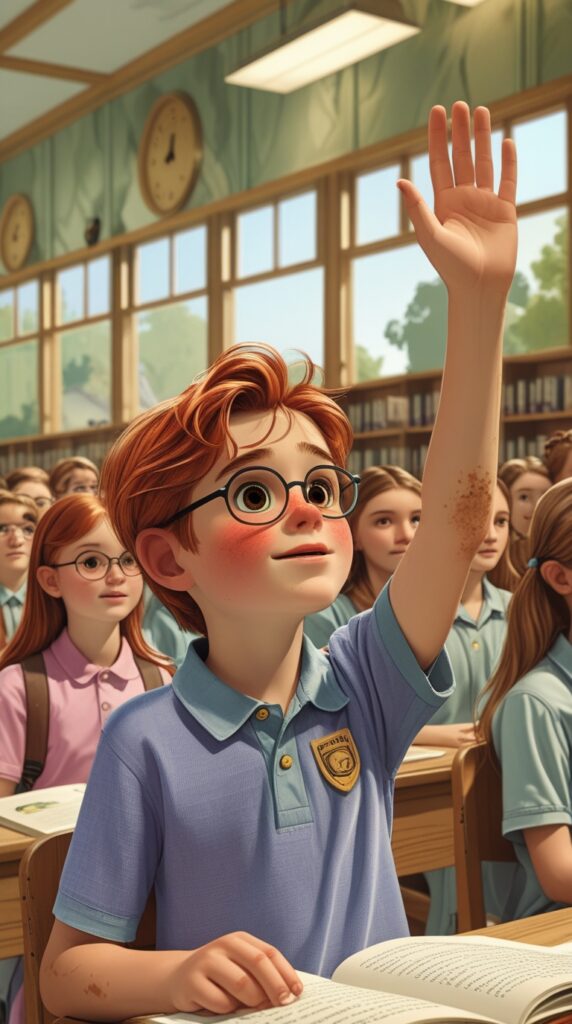
“Yes?” said Miss Gates.
“Well,” Larry spoke softly, “Marcy has a black eye. Does that mean her folks abuse her?”
Miss Gates said, “Marcy, would you like to tell how you received your black eye?”
Marcy stood. Her face and neck were the same bright shade of red as her hair. Her lips and voice trembled as she spoke.
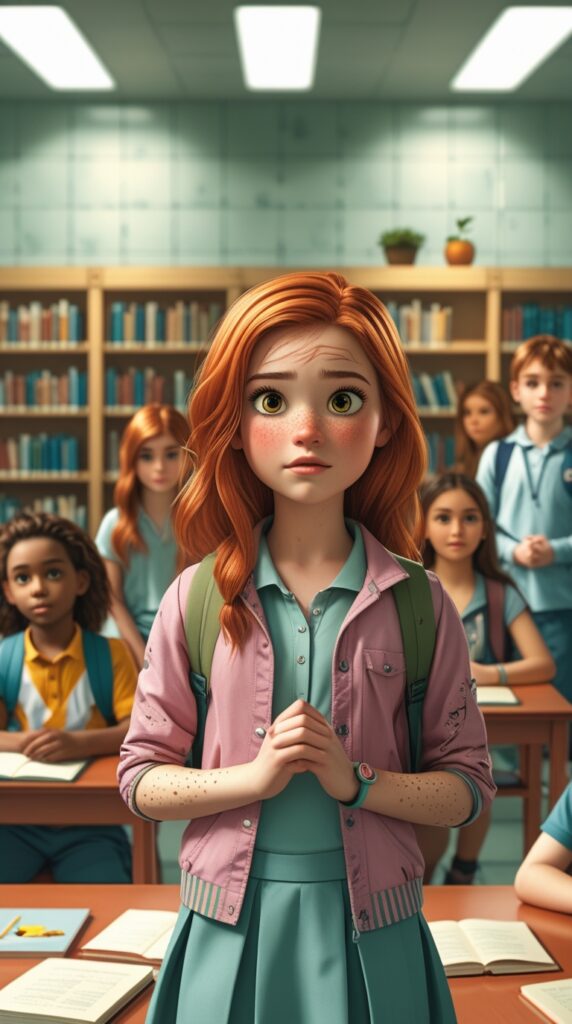
My mom and dad didn’t hit me. I have a sleeping disorder, and I walked in my sleep last night and ran into the door frame.”
She sat back down, her heart pounding.
Miss Gates gave a small nod. “Thank you, Marcy, for being brave enough to speak up. That takes courage.”
Then she turned to the rest of the group. “You see, children, not all bruises mean child abuse. It’s right to be concerned, but we must also be kind and careful. After all, we wouldn’t want to hurt or embarrass someone who’s already going through something difficult.”
Miss Gates gave a small nod. “Thank you, Marcy, for being brave enough to speak up. That takes courage.”
She glanced toward Mr. Goodwin. “That’s all I have for today.”
The room stayed quiet for a moment. Then, gradually, the soft rustle of backpacks and shifting chairs filled the room.
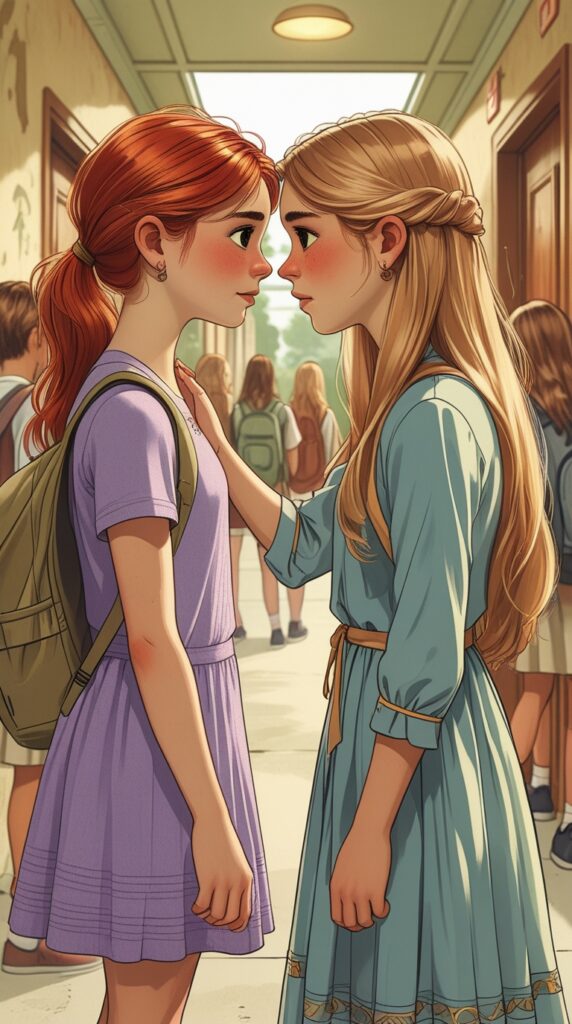
As Marcy stood to leave, she felt a tap on her shoulder. It was Nancy.
“You okay?” she whispered.
Marcy nodded.
Nancy hesitated, then said, “You can always talk to me.”
Marcy smiled and pulled her hair behind her ear as they walked back to their classrooms.
Tomorrow would be better.
📚 Read the Companion Story
If you enjoyed How a Brave Girl Spoke Up, don’t miss the companion piece:
👉 First Day of School: A Short Story About Friendship
This story explores the same classroom world through a different lens—where small acts of kindness can turn a nervous first day into the start of a meaningful friendship.
📢 Need Help or Want to Learn More?
If you’re concerned about a child’s safety or want to learn how to report suspected abuse, visit the official guide from the U.S. Department of Health and Human Services:
How to Report Child Abuse and Neglect
📬 Follow Vicky’s View
Subscribe for fresh posts from the desk of Vicky — AI tools, storytelling, odd moments, grandkid wisdom, and whatever else stirs up trouble (or inspiration).
